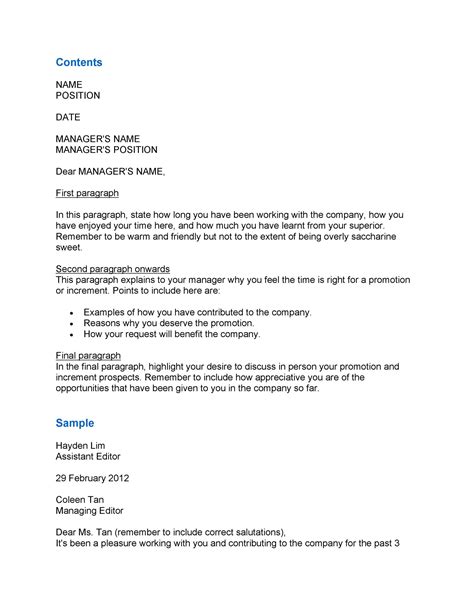Crafting A Salary Increase Letter: Samples And Strategies

Asking for a salary increase can be daunting, but it’s an important step in advancing your career and ensuring that you’re being compensated fairly for your work. In this post, we’ll explore some effective strategies for crafting a salary increase letter that will help you achieve your goals. We’ll also provide samples and templates to help you get started.
1. Research Your Market Value
Before you start drafting your salary increase letter, it’s important to research your market value. This will help you determine what you should be earning based on factors such as your experience, skills, and location. Here are some steps you can take:
- Use online resources such as Glassdoor, Payscale, and Salary.com to research salary ranges for your position in your area.
- Speak with colleagues in your industry to gain insight into what they’re earning.
- Consider your own accomplishments and how they contribute to your value as an employee.
2. Choose the Right Time to Ask
Timing is everything when it comes to asking for a salary increase. Here are some factors to consider:
- Plan to ask for a salary increase after you’ve completed a major project, achieved a significant milestone, or received positive feedback from your supervisor.
- Consider the company’s financial situation and whether they’re in a position to offer a salary increase.
- Take into account the timing of the company’s budget cycle and performance review process.
3. Draft Your Letter
When drafting your salary increase letter, be sure to include the following:
- A clear explanation of why you’re asking for a salary increase.
- Details about your accomplishments and contributions to the company.
- Your research on market value.
- A specific salary increase request.
- A positive and professional tone.
4. Use a Template
If you’re not sure where to start with your salary increase letter, consider using a template. Here are some resources you can use:
- The Muse’s Salary Increase Letter Template
- Indeed’s Salary Increase Letter Template
- Hubspot’s Salary Increase Letter Template
5. Practice Your Pitch
Before you meet with your supervisor to discuss your salary increase, it’s important to practice your pitch. Here are some tips:
- Write out a script and practice it out loud.
- Role-play with a friend or family member.
- Anticipate potential objections and prepare responses.
6. Schedule a Meeting
Once you’ve drafted your salary increase letter and practiced your pitch, it’s time to schedule a meeting with your supervisor. Here are some tips:
- Choose a time when your supervisor is likely to be in a good mood and not too busy.
- Be clear about the purpose of the meeting.
- Provide your salary increase letter in advance so your supervisor has time to review it.
7. Follow Up
After your meeting, it’s important to follow up with your supervisor. Here are some tips:
- Send a thank-you email to your supervisor for taking the time to meet with you.
- Be patient and give your supervisor time to consider your request.
- If your request is denied, ask for feedback on how you can improve your performance to increase your chances of a salary increase in the future.
Conclusion
Asking for a salary increase can be intimidating, but it’s an important step in advancing your career and ensuring that you’re being compensated fairly. By researching your market value, choosing the right time to ask, drafting a strong letter, using a template, practicing your pitch, scheduling a meeting, and following up, you can increase your chances of success.
FAQs
Q: How much of a salary increase should I ask for?
A: The amount of your salary increase request will depend on your research on market value, your contributions to the company, and the financial situation of the company. Be sure to be specific in your request.
Q: What if my supervisor denies my request?
A: If your supervisor denies your request for a salary increase, ask for feedback on how you can improve your performance to increase your chances of a salary increase in the future.
Q: Can I negotiate other benefits besides salary?
A: Yes, you can negotiate other benefits besides salary. Consider benefits such as additional vacation time, a flexible work schedule, or professional development opportunities.
